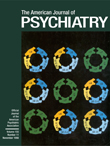To the Editor: The editorial by Charles P. O’Brien, M.D., Ph.D.
(1), presented an eloquent and cogent call for more psychiatric involvement in and more financial support for the treatment of addictive disorders. Dr. O’Brien’s identification of addiction as a chronic disease was, I believe, particularly important.
In this context, one sentence in the editorial concerned me: “A modern conceptualization of addiction is that it acts as a chronic disease produced by thousands of exposures to drugs.” This sentence seems to imply that repeated exposure to drugs is a sufficient condition for developing drug addiction and that thousands of exposures are necessary for an addictive pattern of drug use to develop. I believe that neither of these implications accords with our experience. Repeated exposure to drugs typically produces neuroadaptation, which can manifest as tolerance, withdrawal, or both. While neuroadaptation can contribute to maintaining or increasing drug use, most investigators agree that neither tolerance nor withdrawal is necessary or sufficient for the development (or the diagnosis) of drug addiction. Moreover, an explanation of addiction that depends on repeated exposure cannot account for individual differences in susceptibility to addiction: some individuals who are repeatedly exposed to alcohol or other drugs will develop addictive patterns of substance use, while others with similar exposure will not. That a biopsychological vulnerability to developing addiction exists before the onset of substance use is indicated also by findings in longitudinal and archival studies that childhood temperamental disturbances—including high emotionality, low soothability, and impulsiveness—are associated with later development of alcoholism or drug addiction.
If addiction is not produced by exposure, how, then, can we understand its development? In a general sense, I would describe addiction as a chronic condition that develops through a process that involves complex interactions over time between genetic and environmental factors. More specifically, I would propose that two sets of determinants are involved in the development of an addictive disorder: 1) those that concern underlying neurobiological abnormalities that are shared by all addictive disorders and 2) those that relate to the selection of a particular substance as the one that is preferred for addictive use. I would add that each set includes both genetic and environmental factors. Environmental factors in the development of the underlying neurobiological abnormalities include deficiencies in the child’s caregiving environment during the first years of life, when the maturing brain is most sensitive to external influences and depends on particular qualities of interchange with the caregiving environment for its healthy development. Genetic factors in selection include genetically based variations in 1) the sensitivity of the reward system to different substances, 2) the body’s sensitivity to immediate aversive consequences of using a substance (such as flushing or standing ataxia after ingestion of alcohol), and 3) the intensity of the individual’s sensitivity to various painful affects, since the substance that brings relief from the most disturbing affects is thereby associated with the strongest negative reinforcement.

